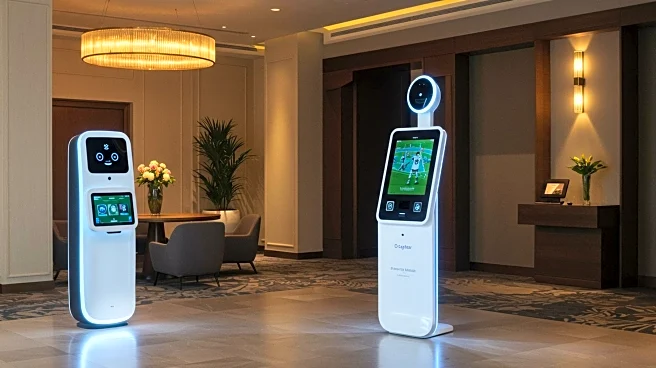What is the story about?
What's Happening?
The hospitality industry is witnessing a transformative shift with the integration of artificial intelligence (AI) technologies. AI is being utilized to enhance guest experiences by providing personalized services and improving operational efficiency. For instance, AI tools are being used to analyze guest interactions to understand emotional rhythms and stress indicators, allowing staff to better anticipate guest needs. Additionally, AI is enabling the creation of responsive environments where room settings such as lighting and temperature are adjusted based on guest preferences. The technology is also being applied to improve sustainability efforts, such as optimizing energy consumption and reducing food waste. These advancements are part of a broader trend where AI is not replacing human interaction but augmenting it to provide a more tailored and efficient service.
Why It's Important?
The integration of AI in the hospitality sector is significant as it represents a shift towards more personalized and efficient guest services. This technological advancement can lead to increased customer satisfaction and loyalty, which are crucial for the competitive hospitality market. Moreover, the use of AI for sustainability efforts aligns with the growing demand for environmentally responsible practices, potentially reducing operational costs and environmental impact. As AI continues to evolve, it could redefine industry standards, offering new opportunities for innovation and growth. However, it also raises questions about the balance between technology and the human touch in hospitality, a sector traditionally valued for its personal service.
What's Next?
As AI technology continues to develop, the hospitality industry is likely to see further innovations in guest services and operational efficiency. Hotels may increasingly adopt AI-driven systems to enhance personalization and sustainability. The industry could also explore new AI applications, such as virtual reality experiences and advanced data analytics for market insights. Stakeholders, including hotel operators and technology providers, will need to collaborate to address challenges such as data privacy and the integration of AI with existing systems. The ongoing evolution of AI in hospitality will require continuous adaptation and training for staff to effectively leverage these technologies.
Beyond the Headlines
The rise of AI in hospitality also brings ethical considerations, particularly regarding data privacy and the potential for job displacement. As AI systems collect and analyze vast amounts of personal data, ensuring the security and privacy of this information will be paramount. Additionally, while AI can enhance efficiency, there is a risk that it could lead to reduced employment opportunities in certain roles. The industry will need to navigate these challenges carefully, balancing technological advancement with ethical responsibilities and workforce implications.

















